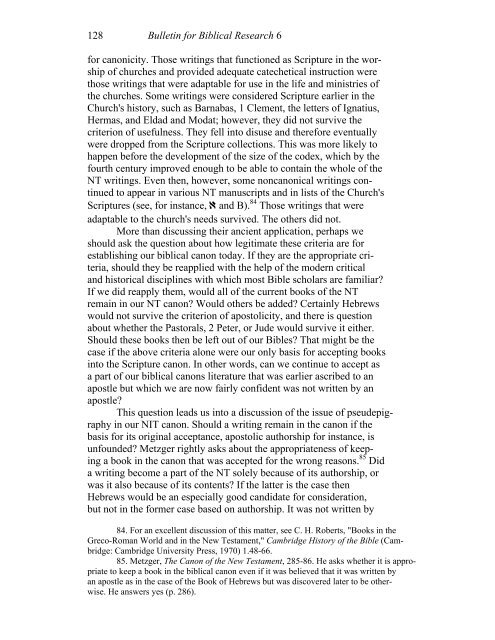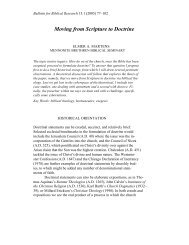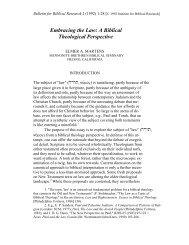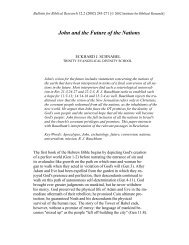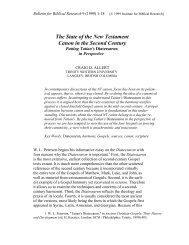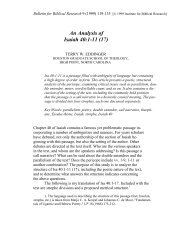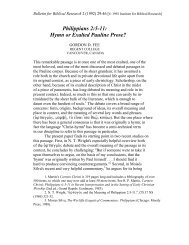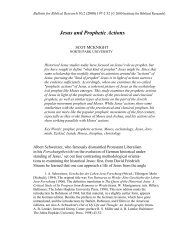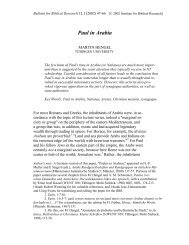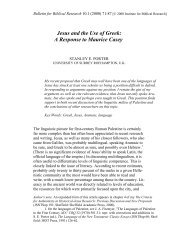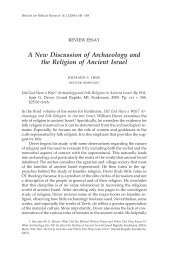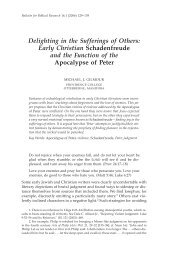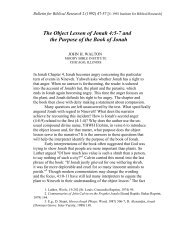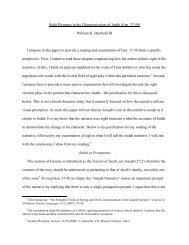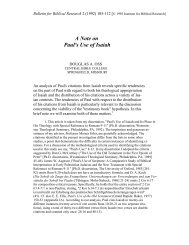The Integrity of the Biblical Canon in Light of Its Historical ...
The Integrity of the Biblical Canon in Light of Its Historical ...
The Integrity of the Biblical Canon in Light of Its Historical ...
Create successful ePaper yourself
Turn your PDF publications into a flip-book with our unique Google optimized e-Paper software.
128 Bullet<strong>in</strong> for <strong>Biblical</strong> Research 6<br />
for canonicity. Those writ<strong>in</strong>gs that functioned as Scripture <strong>in</strong> <strong>the</strong> worship<br />
<strong>of</strong> churches and provided adequate catechetical <strong>in</strong>struction were<br />
those writ<strong>in</strong>gs that were adaptable for use <strong>in</strong> <strong>the</strong> life and m<strong>in</strong>istries <strong>of</strong><br />
<strong>the</strong> churches. Some writ<strong>in</strong>gs were considered Scripture earlier <strong>in</strong> <strong>the</strong><br />
Church's history, such as Barnabas, 1 Clement, <strong>the</strong> letters <strong>of</strong> Ignatius,<br />
Hermas, and Eldad and Modat; however, <strong>the</strong>y did not survive <strong>the</strong><br />
criterion <strong>of</strong> usefulness. <strong>The</strong>y fell <strong>in</strong>to disuse and <strong>the</strong>refore eventually<br />
were dropped from <strong>the</strong> Scripture collections. This was more likely to<br />
happen before <strong>the</strong> development <strong>of</strong> <strong>the</strong> size <strong>of</strong> <strong>the</strong> codex, which by <strong>the</strong><br />
fourth century improved enough to be able to conta<strong>in</strong> <strong>the</strong> whole <strong>of</strong> <strong>the</strong><br />
NT writ<strong>in</strong>gs. Even <strong>the</strong>n, however, some noncanonical writ<strong>in</strong>gs cont<strong>in</strong>ued<br />
to appear <strong>in</strong> various NT manuscripts and <strong>in</strong> lists <strong>of</strong> <strong>the</strong> Church's<br />
Scriptures (see, for <strong>in</strong>stance, ) and B). 84 Those writ<strong>in</strong>gs that were<br />
adaptable to <strong>the</strong> church's needs survived. <strong>The</strong> o<strong>the</strong>rs did not.<br />
More than discuss<strong>in</strong>g <strong>the</strong>ir ancient application, perhaps we<br />
should ask <strong>the</strong> question about how legitimate <strong>the</strong>se criteria are for<br />
establish<strong>in</strong>g our biblical canon today. If <strong>the</strong>y are <strong>the</strong> appropriate criteria,<br />
should <strong>the</strong>y be reapplied with <strong>the</strong> help <strong>of</strong> <strong>the</strong> modern critical<br />
and historical discipl<strong>in</strong>es with which most Bible scholars are familiar?<br />
If we did reapply <strong>the</strong>m, would all <strong>of</strong> <strong>the</strong> current books <strong>of</strong> <strong>the</strong> NT<br />
rema<strong>in</strong> <strong>in</strong> our NT canon? Would o<strong>the</strong>rs be added? Certa<strong>in</strong>ly Hebrews<br />
would not survive <strong>the</strong> criterion <strong>of</strong> apostolicity, and <strong>the</strong>re is question<br />
about whe<strong>the</strong>r <strong>the</strong> Pastorals, 2 Peter, or Jude would survive it ei<strong>the</strong>r.<br />
Should <strong>the</strong>se books <strong>the</strong>n be left out <strong>of</strong> our Bibles? That might be <strong>the</strong><br />
case if <strong>the</strong> above criteria alone were our only basis for accept<strong>in</strong>g books<br />
<strong>in</strong>to <strong>the</strong> Scripture canon. In o<strong>the</strong>r words, can we cont<strong>in</strong>ue to accept as<br />
a part <strong>of</strong> our biblical canons literature that was earlier ascribed to an<br />
apostle but which we are now fairly confident was not written by an<br />
apostle?<br />
This question leads us <strong>in</strong>to a discussion <strong>of</strong> <strong>the</strong> issue <strong>of</strong> pseudepigraphy<br />
<strong>in</strong> our NIT canon. Should a writ<strong>in</strong>g rema<strong>in</strong> <strong>in</strong> <strong>the</strong> canon if <strong>the</strong><br />
basis for its orig<strong>in</strong>al acceptance, apostolic authorship for <strong>in</strong>stance, is<br />
unfounded? Metzger rightly asks about <strong>the</strong> appropriateness <strong>of</strong> keep<strong>in</strong>g<br />
a book <strong>in</strong> <strong>the</strong> canon that was accepted for <strong>the</strong> wrong reasons. 85 Did<br />
a writ<strong>in</strong>g become a part <strong>of</strong> <strong>the</strong> NT solely because <strong>of</strong> its authorship, or<br />
was it also because <strong>of</strong> its contents? If <strong>the</strong> latter is <strong>the</strong> case <strong>the</strong>n<br />
Hebrews would be an especially good candidate for consideration,<br />
but not <strong>in</strong> <strong>the</strong> former case based on authorship. It was not written by<br />
84. For an excellent discussion <strong>of</strong> this matter, see C. H. Roberts, "Books <strong>in</strong> <strong>the</strong><br />
Greco-Roman World and <strong>in</strong> <strong>the</strong> New Testament," Cambridge History <strong>of</strong> <strong>the</strong> Bible (Cambridge:<br />
Cambridge University Press, 1970) 1.48-66.<br />
85. Metzger, <strong>The</strong> <strong>Canon</strong> <strong>of</strong> <strong>the</strong> New Testament, 285-86. He asks whe<strong>the</strong>r it is appropriate<br />
to keep a book <strong>in</strong> <strong>the</strong> biblical canon even if it was believed that it was written by<br />
an apostle as <strong>in</strong> <strong>the</strong> case <strong>of</strong> <strong>the</strong> Book <strong>of</strong> Hebrews but was discovered later to be o<strong>the</strong>rwise.<br />
He answers yes (p. 286).


